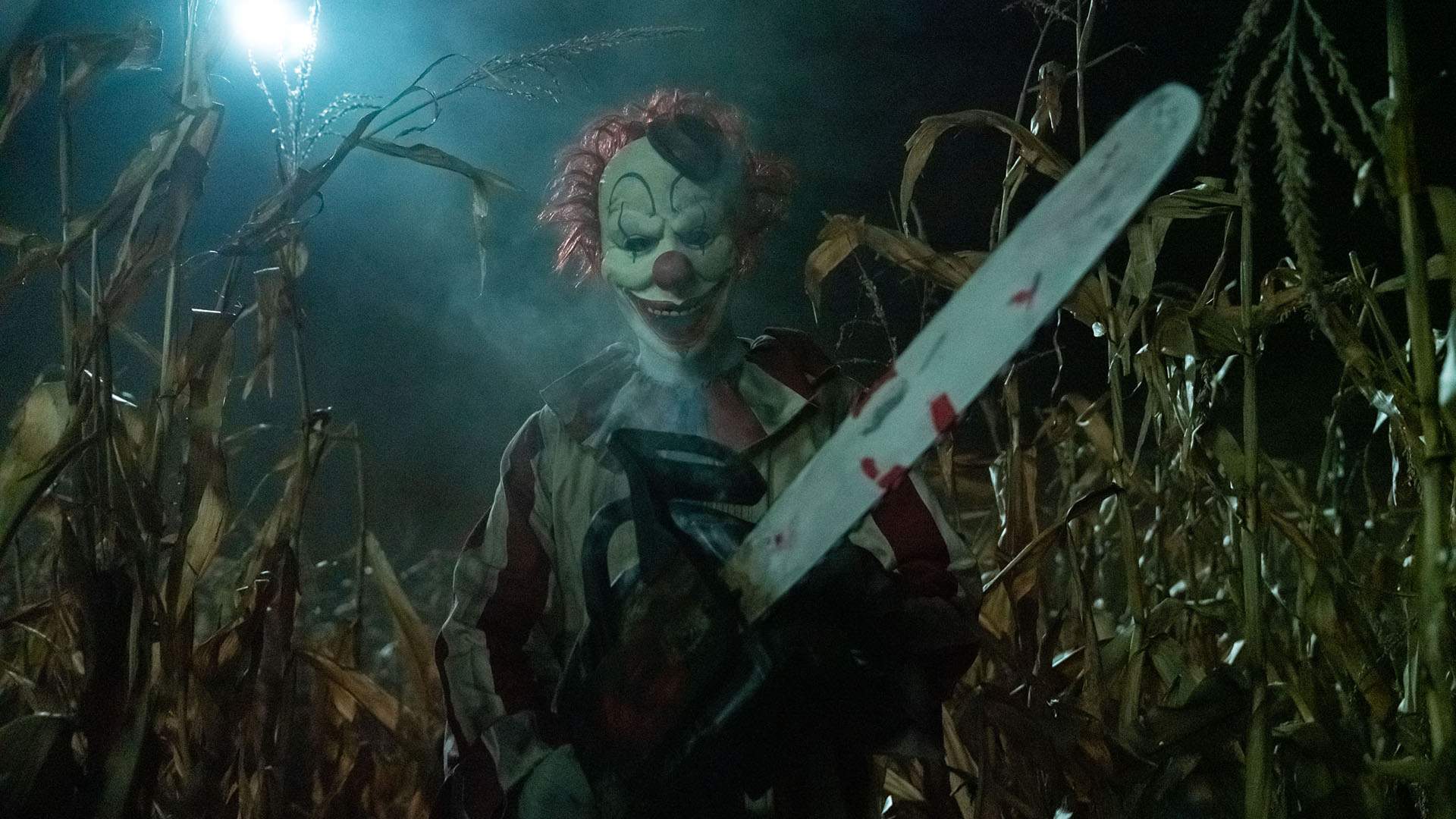From 'Tucker and Dale vs Evil' to a Slasher Flick About a Killer Jester: Eli Craig Talks 'Clown in a Cornfield'
"I'm terrified of clowns. I've always found them to be very duplicitous and very not-trustworthy," Craig told us about putting the makeup-clad characters at the heart of this third film.
Four decades back, and three as well, Clown in a Cornfield would've stood out on a video store's shelves. It would've proven an instant hot rental, in fact. The slasher film just has that kind of title. The immediately evocative name comes from the page, where this tale of a killer jester sparking bloody mayhem rather than big laughs in a rural Missouri community initially appeared courtesy of author Adam Cesare. Not just for its moniker, the book won the 2020 Bram Stoker Award for Best Young Adult Novel.
Eli Craig, the director of Clown in a Cornfield as a film — and its and co-screenwriter with Carter Blanchard (G vs E) — is no stranger to terrific titles himself. He was initially interested in this as his third feature due to its name, because who wouldn't be? That tracks across his career, however; his first two movies also had marvellous monikers. Fifteen years ago, Craig's Tucker and Dale vs Evil started earning horror- and comedy-loving devotees, and now is deservedly considered a 21st-century classic. When Little Evil arrived in 2017, it also had a title that stood out.
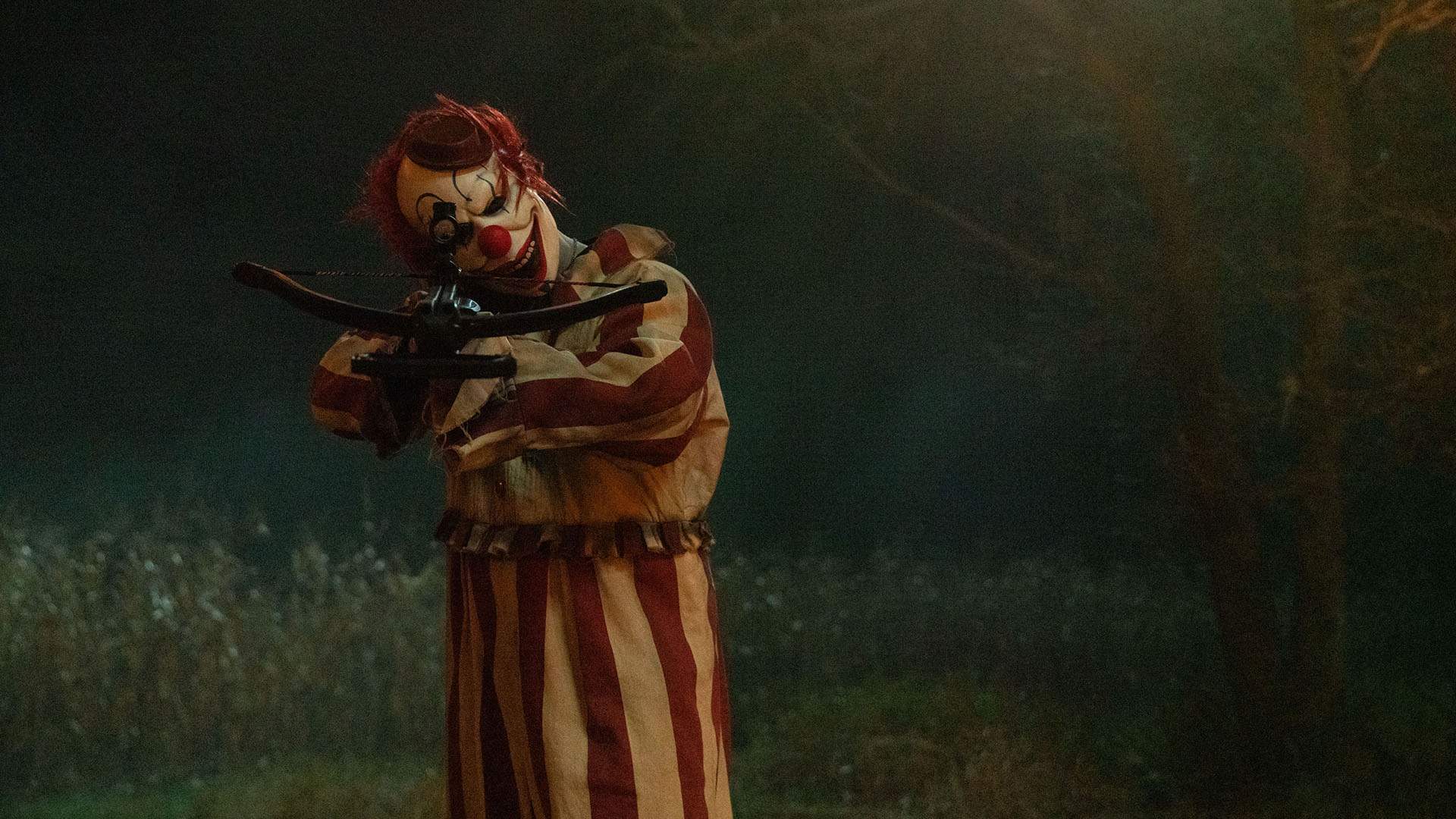
How much stock does Craig put in a great name for a movie? "I think a great title is what gets people's attention more than almost any marketing. And it's very fun to me to mashup a title in a way that feels provocative — like you say, and unique. And feels like it tells the story," he tells Concrete Playground. "But then when you go see the movie, it actually has a lot more depth and complexity than the title gives you. So for Tucker and Dale vs Evil, it seems kind of silly and goofy — and, of course, it is a very heightened comedy. But it also has these layers of things it's about, and that is much deeper than you would think."
"And it's the same with Clown in a Cornfield," Craig continues. "I think once people see it, they'll be like 'oh, this is actually saying a lot of things. It's not just a goofy movie about a clown and a cornfield'."
Clown in a Cornfield is definitely a flick about a clown and a cornfield. It makes good on that promise. It also pushes horror further to the fore than Craig's past features did. This is equally a slasher that uses that high-concept premise to dig into generational divides, economic uncertainty, and both capitalism and the American dream gone wrong, though. As it follows high schooler Quinn Maybrook (Katie Douglas, Ginny & Georgia) and her widower father (Aaron Abrams, Children Ruin Everything) to Kettle Springs, where the latter is about to be the new town doctor — and where the existing resident adults, such as Sheriff Dunne (Will Sasso, George & Mandy's First Marriage) and Mayor Arthur Hill (Kevin Durand, Kingdom of the Planet of the Apes), yearn for the locale's past, while teens such as Arthur's son Cole (Carson MacCormac, Shazam! Fury of the Gods) are looking forward instead — it has societal bite to go along with its blood and gore.
In Clown in a Cornfield, the character that lives up to the movie's moniker is Frendo, the mascot for the local Baypen Factory, which once kept much of the town employed. Since the corn outfit closed down, its harlequin has become a symbol of happiness and prosperity corrupted, embodying everything that Kettle Springs has lost — and sparking that chasm between its authority figures and everyone of their age with the next generation. In both the picture's 90s-set opening and its present-day bulk, a slicing-and-dicing Frendo is hardly a pal, then. It's positively homicidal, with dispensing with Quinn and her peers its aim.
Craig himself has a phobia of them — "I'm terrified of clowns," he shares — but these makeup-adorned figures have long been both jovial and creepy characters in pop culture. His isn't the first feature to play up their eerie side, of course, including in the last decade. IT and IT: Chapter Two became huge box-office hits in 2017 and 2019, and a TV prequel is on the way to HBO. The currently three-strong Terrifier franchise has been getting gruesome on-screen since 2018, with a fourth flick in development.
Is making a movie about a murderous clown cathartic when you're already afraid of them? Our chat with Craig started there. Also covered: Clown in a Cornfield's clear love for other slasher and horror films, what goes into a great scary-flick kill, and how the gulf between the film's younger and older characters also provides inspiration for some of its humour, including a pitch-perfect moment with a rotary phone — plus why Douglas was the right choice for Quinn, and fleshing out Sasso and Durand's parts. What does the affection now held by horror-movie lovers for Tucker and Dale vs Evil 15 years on, even if it wasn't the success that Craig was expecting when it released, mean to him, too? That was part of our discussion as well.

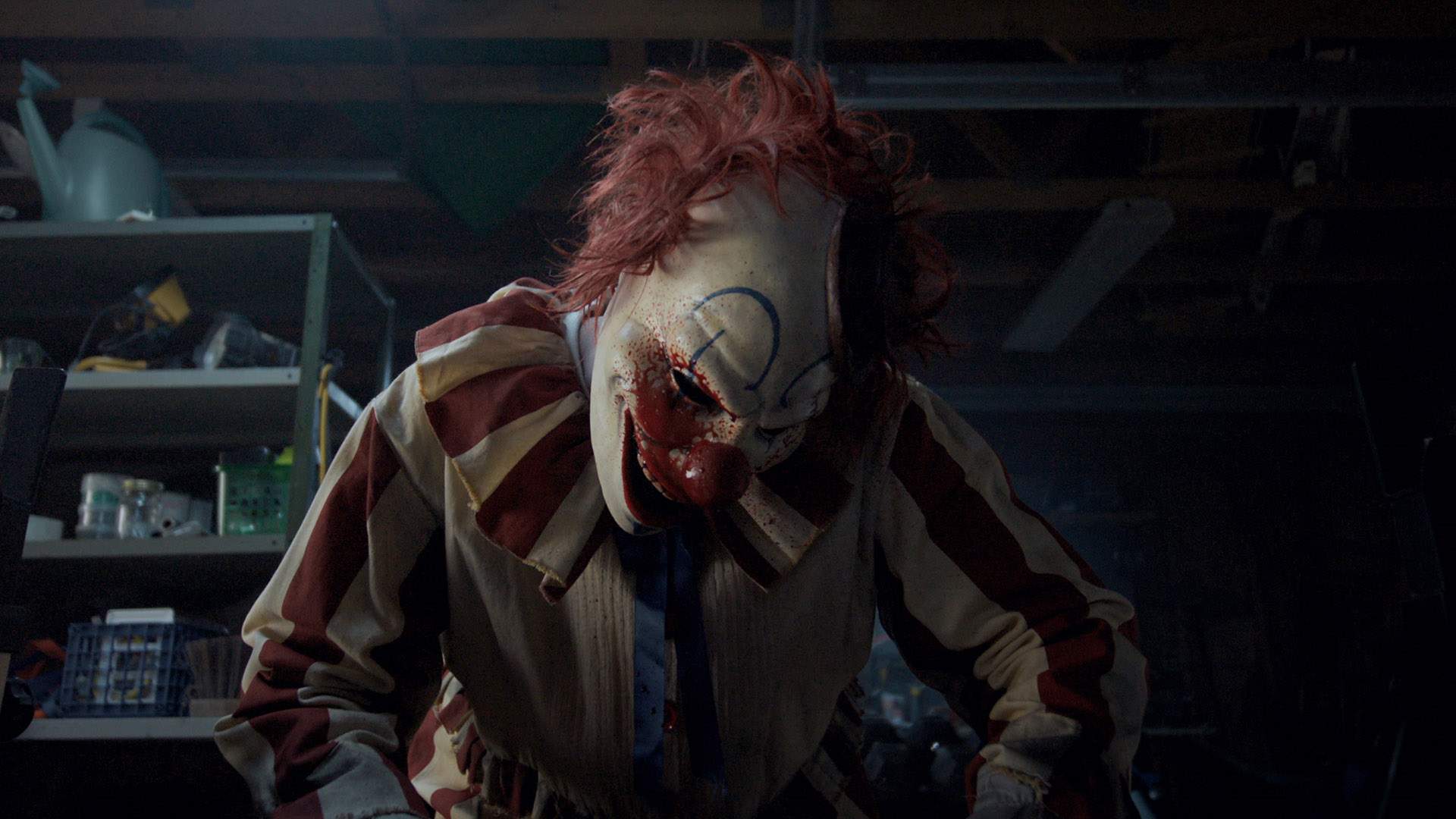
On Being Afraid of Clowns While Making a Movie About Murderous Jesters — and No, It Isn't Cathartic
"I've always found them to be very duplicitous and very not-trustworthy. And I always thought it was kind of funny that clowns would go to kids' birthday parties. I find magicians kind of scary, too. And we once had a magician to my son's birthday, but we elected not to have a clown.
But in my last film Little Evil, I had a scene with a clown that spontaneously combusted on fire, because the kid had superpowers — and I really was thinking 'I have to do more with these clowns because they are just naturally disconcerting'.
You'd think that maybe I'd have less fear of clowns now, but it's actually the opposite. I think Frendo has surprised me at various publicity events already, where he sneaks up behind me — and I'm always the one that's like 'aah'.
So I haven't gotten over my fear of clowns, but there is something quite magical and fun about them, too. So it's that mixture of fear and loathing."

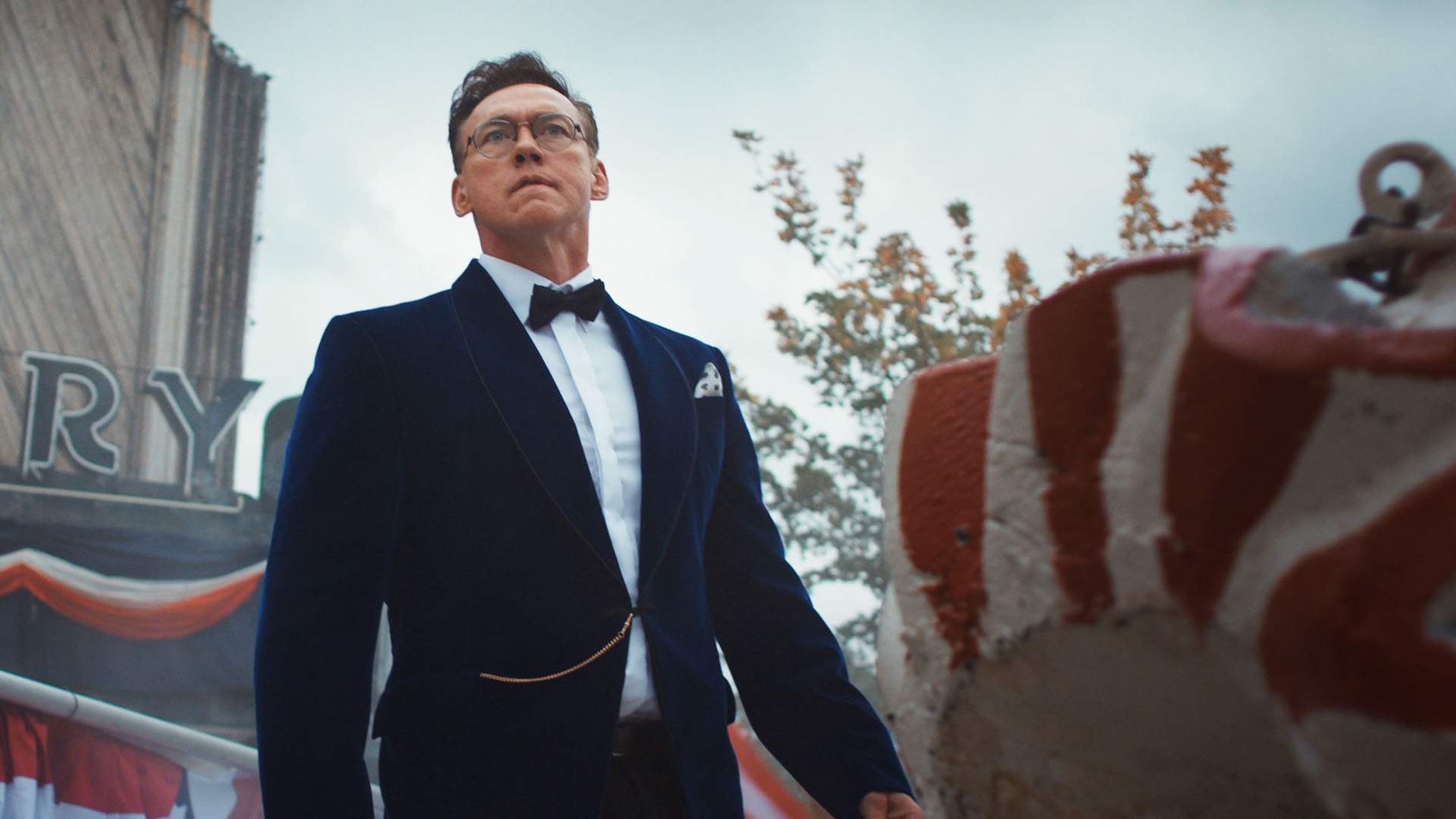
On Clown in a Cornfield's Societal Bite — aka Making a Killer Clown Flick About Generational Chasms, Capitalism Gone Wrong and Economic Uncertainty
"That was in the book, and that's why I wanted to make the movie, because I was really surprised at what Adam Cesare was able to get at about this generational anger, I think — and this divide between a younger generation that's more progressive and maybe cares about the earth and cares about their future, and maybe an older generation that just feels like they're just harvesting the earth for their own greed. And I thought that frustration is just really apropos to our time.
And also, I would say the thing that's so interesting about using a clown to tell that story is that originally clowns were like court jesters, and they were the only ones that were kind of allowed to tell truth to power and to tell the king what maybe was really up — but they had to do it with a sense of humour and satire.
So this movie, in a way, it's fun because it has these layers of truth underneath it, and it's a clown telling that story to people. That isn't necessary to love the movie. You could love the movie and not really care about anything deeper. But I think through humour and entertainment is a lot of the ways we get some of our ideas that break through the walls to meet us. So that was quite fun to play with."

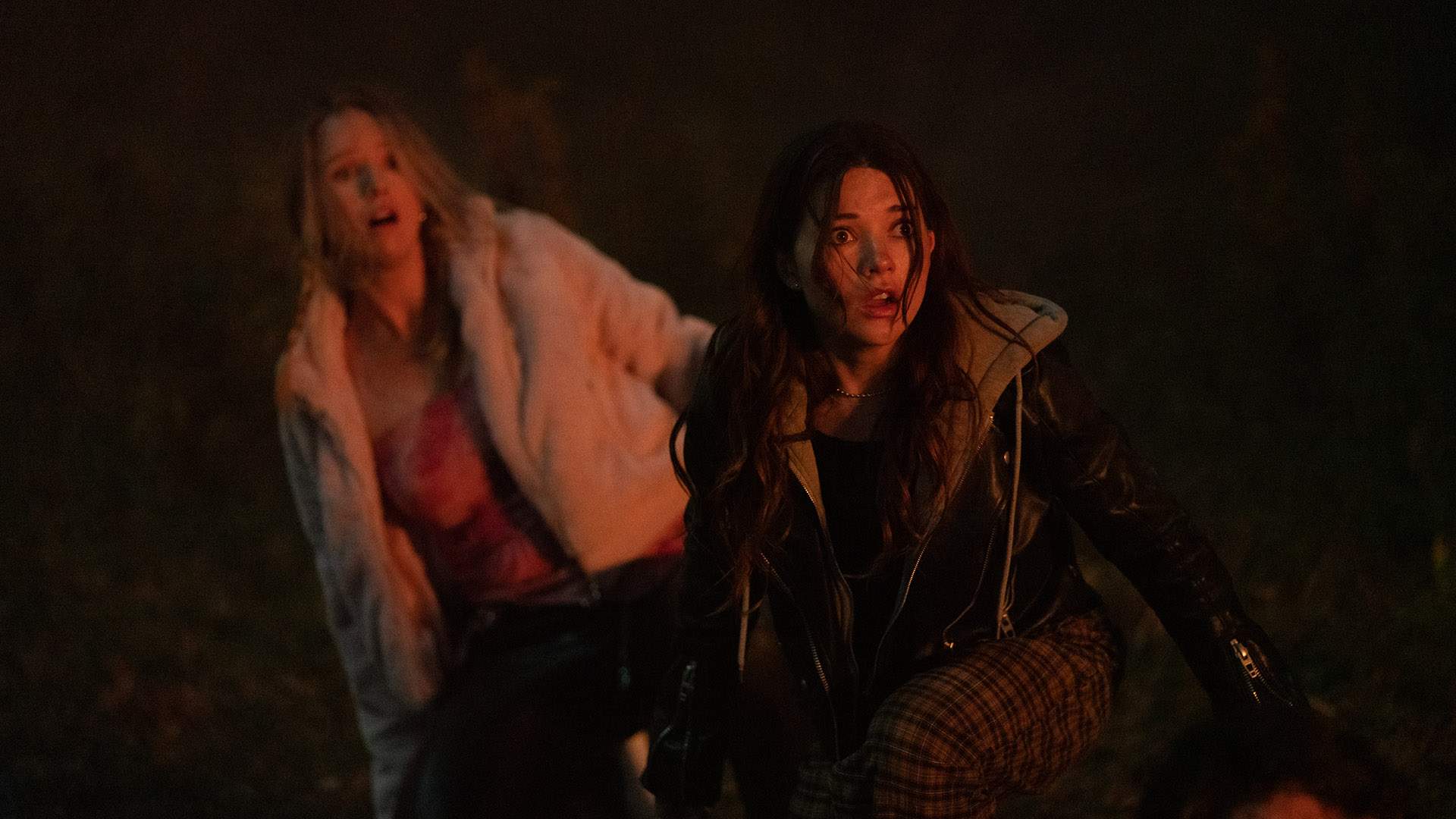
On Balancing the Film's Evident Love for Slasher and Horror Greats That've Gone Before with Being Its Own Addition to the Genre
"I just want to embrace all the movies I saw as a kid. I grew up in the 80s and early 90s, and watched everything from the Halloween movies, Friday the 13th, all of Freddy Krueger stuff — and I also loved the comedy-horror movies like Evil Dead 2.
And so a lot of it, to me, just lives in like this bouillabaisse inside my brain, and I don't necessarily know when I'm picking a trope from this movie or that, but they kind of live there. And it's funny to watch other people pick them out and say 'oh, you did this here and this here'.
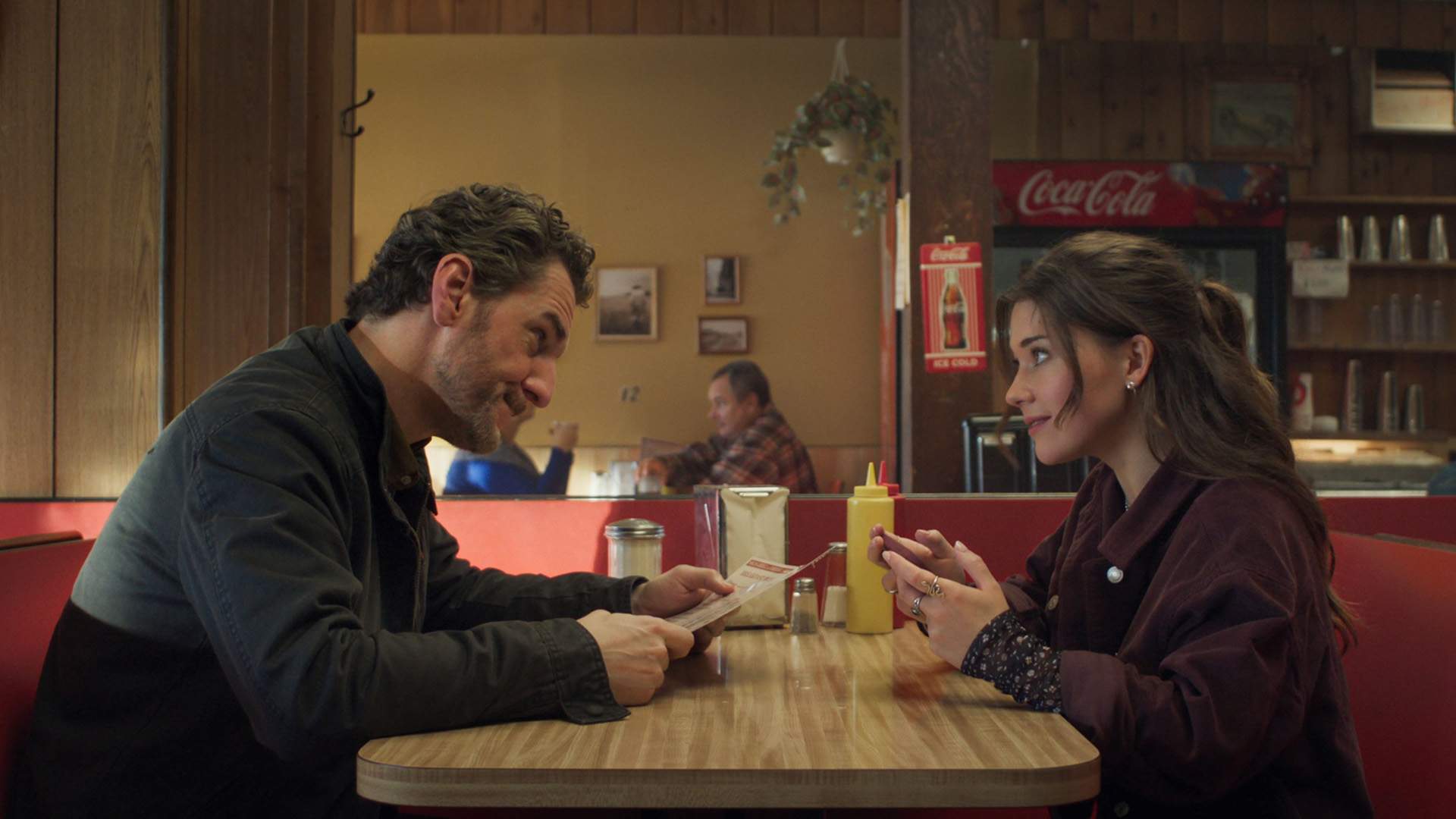
I just kind of feel the tropes and I start writing them, and I don't necessarily pick them all out.
The one thing is Jaws, I did play directly to Jaws in this movie, because that is probably my favourite horror movie that goes under the radar as not really being a horror movie — but it definitely is. It scared the pants off me."

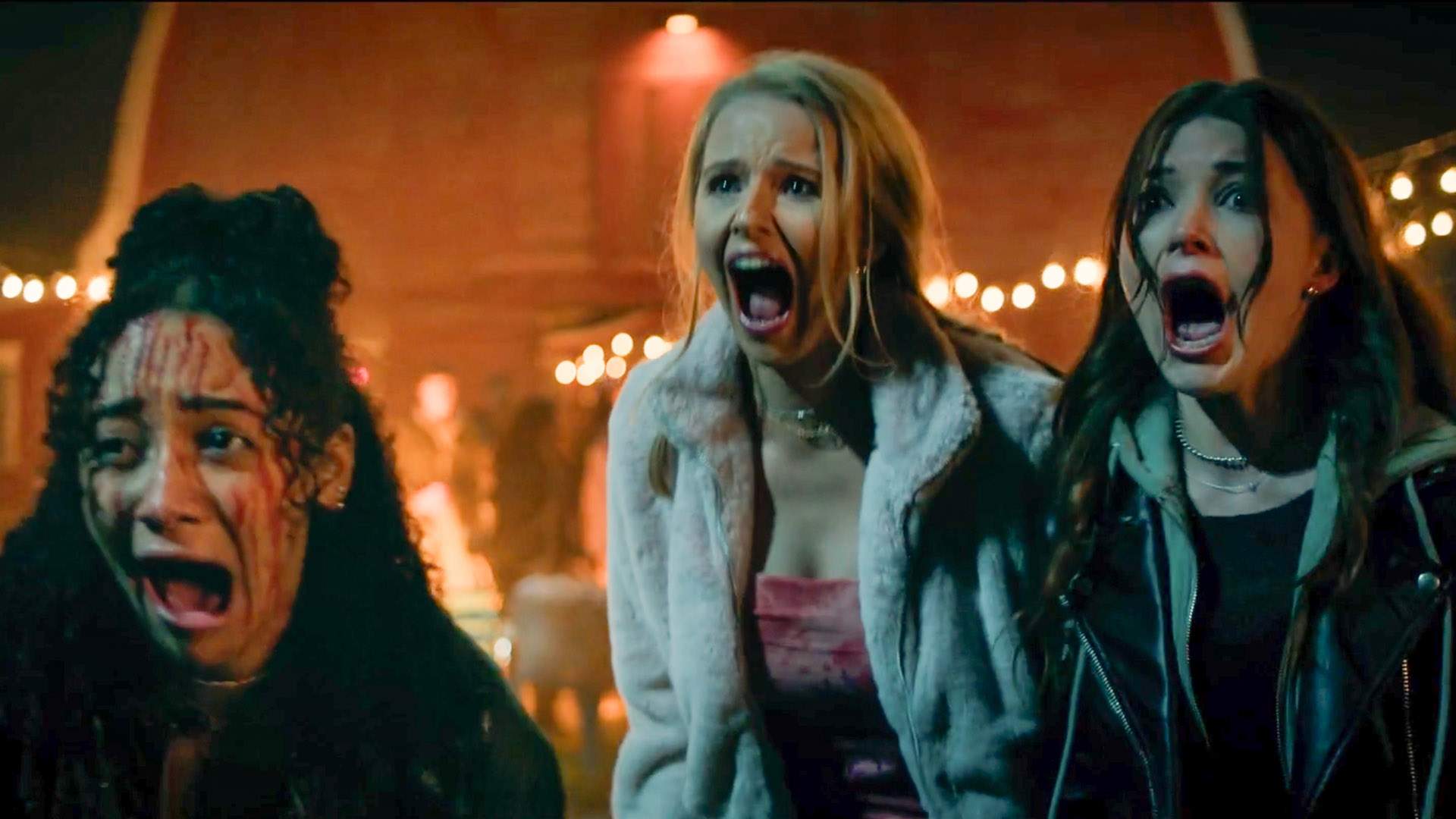
On What Makes a Memorable Slasher-Movie Kill for Craig — and How Easy or Difficult That Is to Achieve
"Well, I think a lot about how to heighten it, how to make it just a little bit more than say — I always love the Scream movies, but I find that Ghostface with this knife gets a little repetitive, so I'm trying to come up with a new way for each kill to be just slightly different. And what are the tools this farmer-type Frendo the clown might use?
And so you come up with pitchforks and chainsaws and axes and sledgehammers and all kinds of tools, and then you just try to heighten that and make it something people will grin at and laugh and cheer, and also be freaked out about, all at the same time."

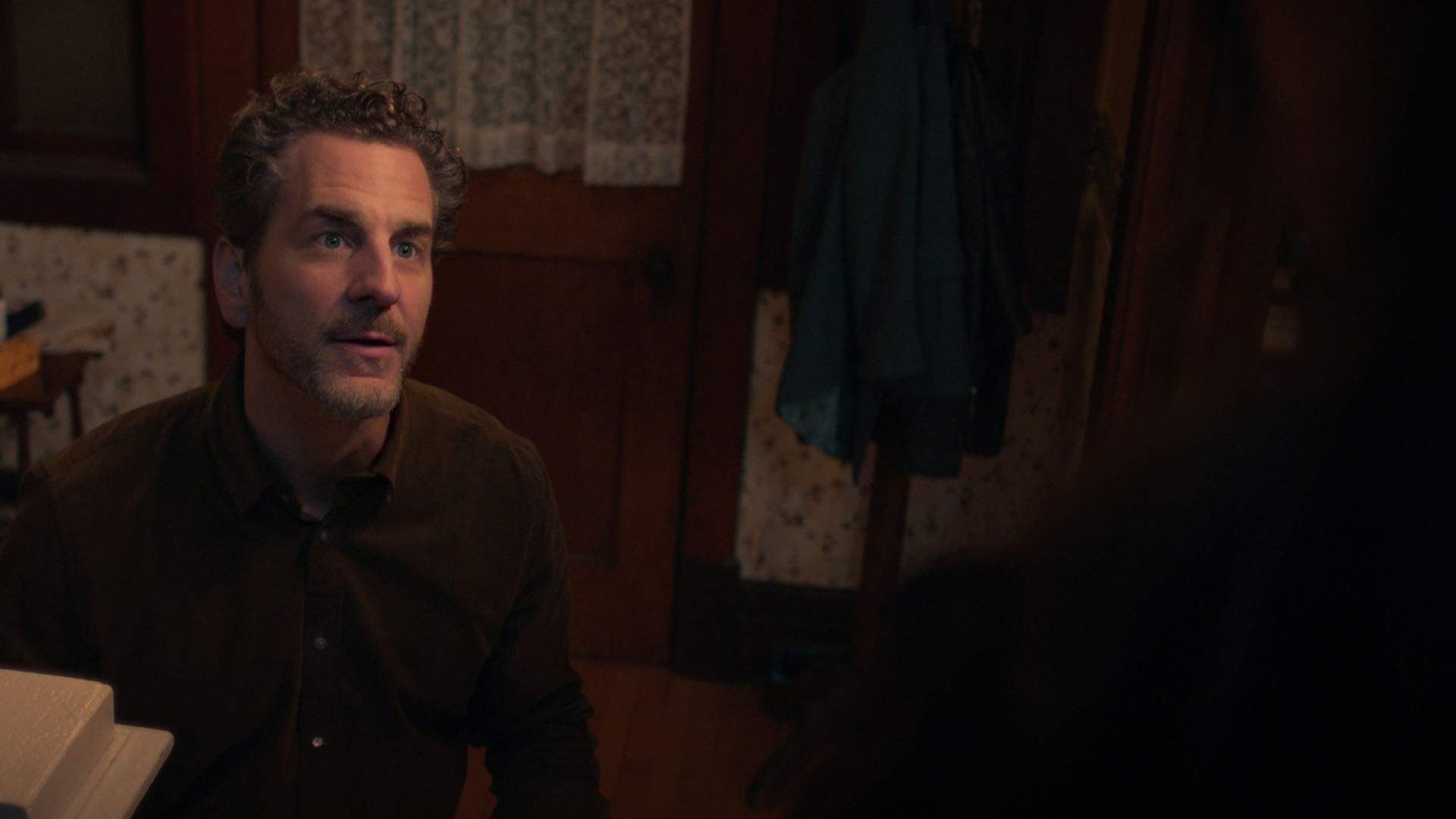
On Skewing More on the Horror Side of the Scale Than Comedy Compared to Craig's Previous Features
"I did a real comedy-first horror with Tucker and Dale, and then I did almost just a comedy with horror elements with Little Evil. And I really wanted to dive back into horror and do kind of a hard-R, gritty in some ways, horror film — but with some levity because that's just the way I am.
I'm not a really dark person — and I like humour in my stories. And I think there's just humour in the darkest parts of life."

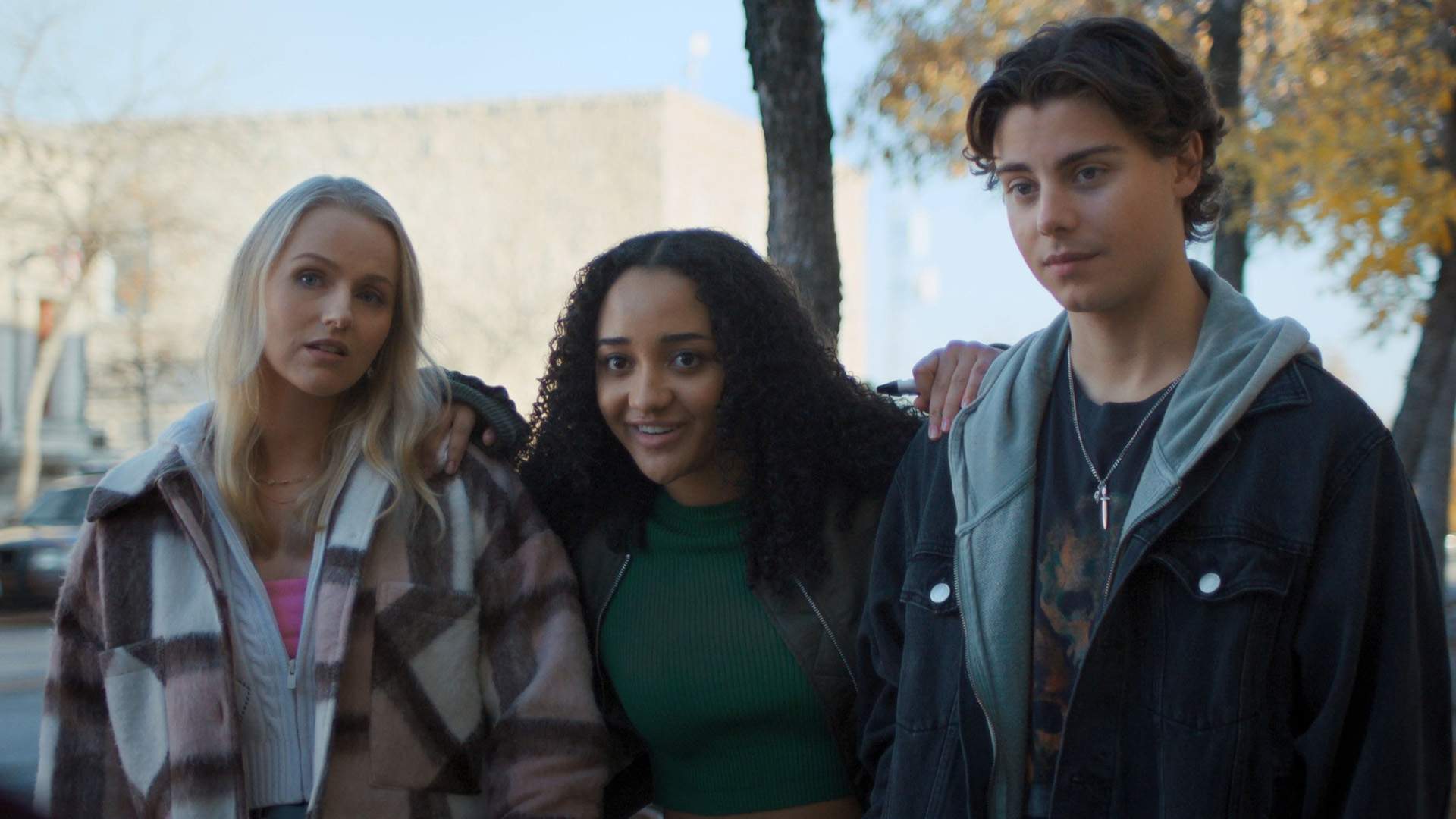
On Layering the Film with Comic Touches That Also Get to the Heart of Its Generational Clash
"When you have the opportunity to nail a joke that also is just inherent in the theme, it really makes me smile. It makes me really excited when I'm sitting there writing and I go 'oh, oh, this is going to be really good' — because you're not breaking out of the story to make a joke. It's just very much within the context of the film.
So it's really exciting when those present themselves. I don't feel like I'm making a joke. I feel like comes to me out of the ether. And it just presents itself to me, and then that's the opportunity to do it.
There's a few points in this movie that grabbed the theme and make a joke out of it."

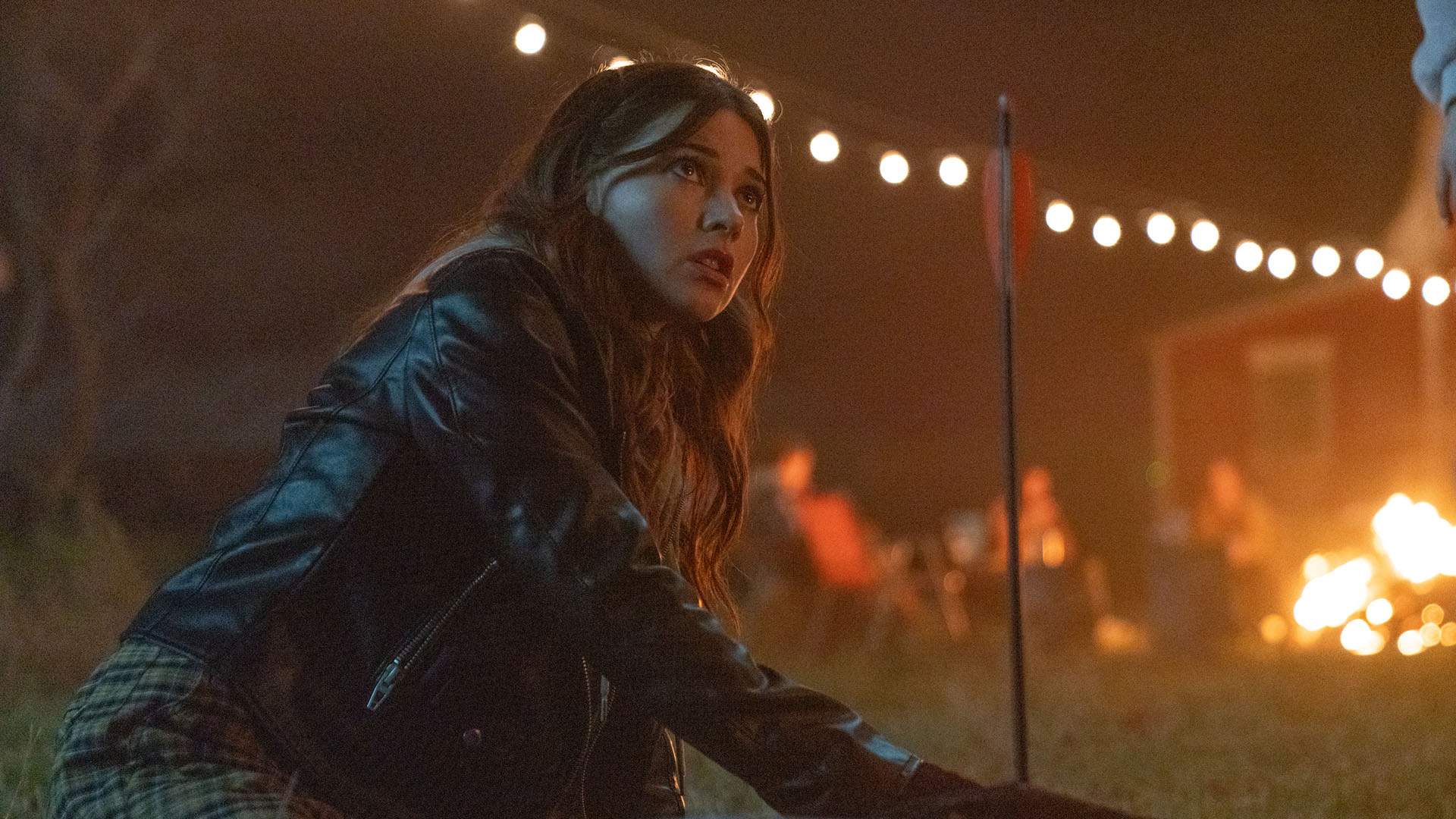
On Knowing That Katie Douglas Was Clown in a Cornfield's Lead
"You'd be surprised — I wanted to cast her before even auditioning her. I had watched a ton of her work. I saw that she had been working since she was about six years old, and she actually has a ton of work under her belt — and all of the stuff I saw from her from, like Ginny & Georgia and also this show called Pretty Hard Cases, and she did some Lifetime movies and she did some short films, and I literally went in and I watched them all.
And I just always saw this sort of grounded, natural performance with the toughness and an edge to her, and sort of a sarcasm to her, that I felt just was Quinn.
She auditioned for it, and completely nailed the audition. And I couldn't have been more blessed to have somebody that was so ready for being number one on the call sheet. She was so ready to lead this film. And she carried the film — and she does a fantastic job."

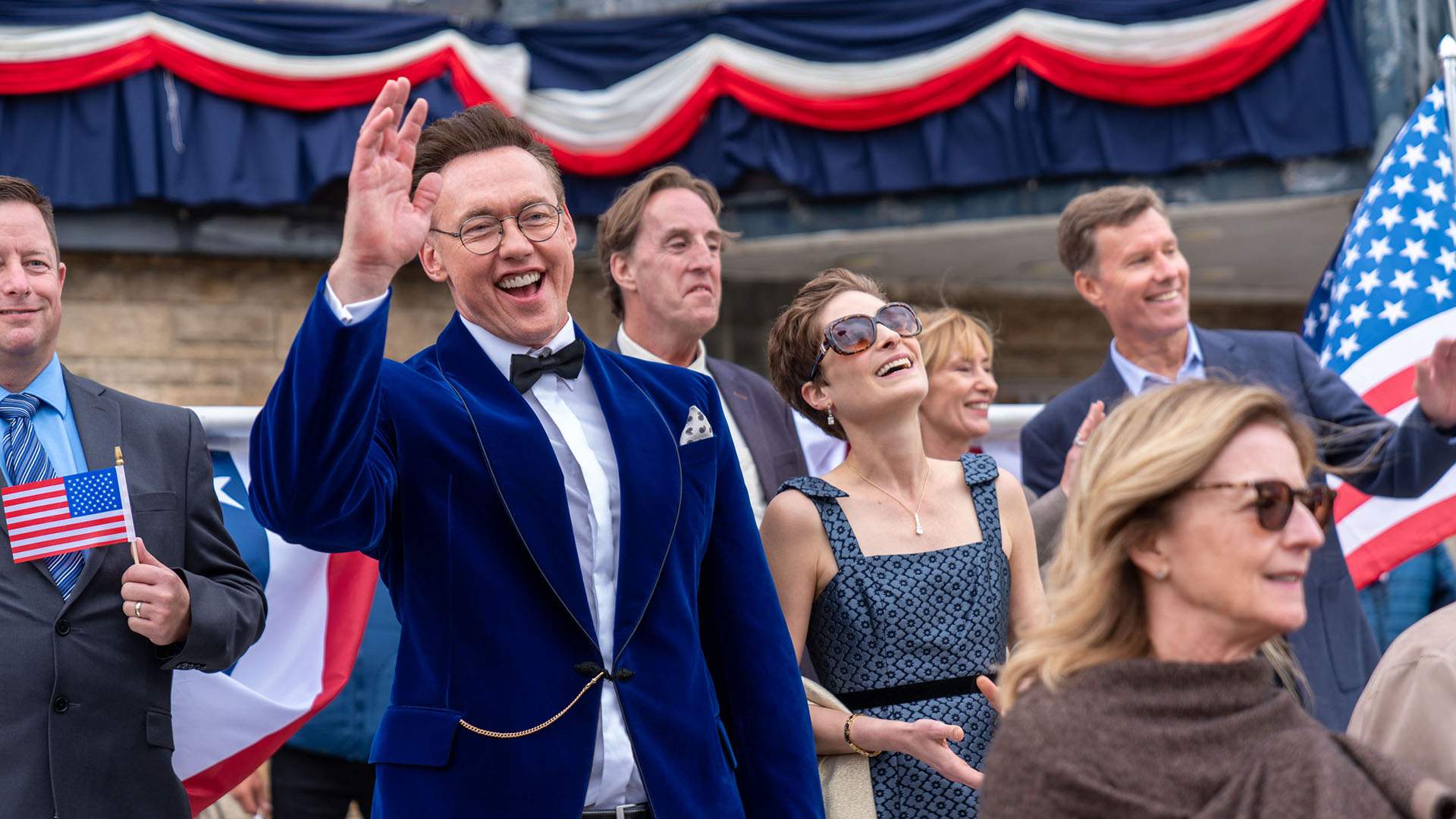
On the Kind of Guidance That You Give Actors Like Will Sasso and Kevin Durand When They're Tasked with Fleshing Out Horror-Movie Characters That Could Be Cartoonish in Other Hands
"I tell them kind of exactly what you just said. I wanted this character to be deeper, and we talk about what their motivations are. So usually they're not thinking about the characters being a villain — they're thinking about them being justified.
So every good actor is always justifying their hatred or villainy for their character, and it make has to make sense to them. So anytime it doesn't make sense, we have to work on it. But those guys are so talented. They brought so much of themselves to the role.
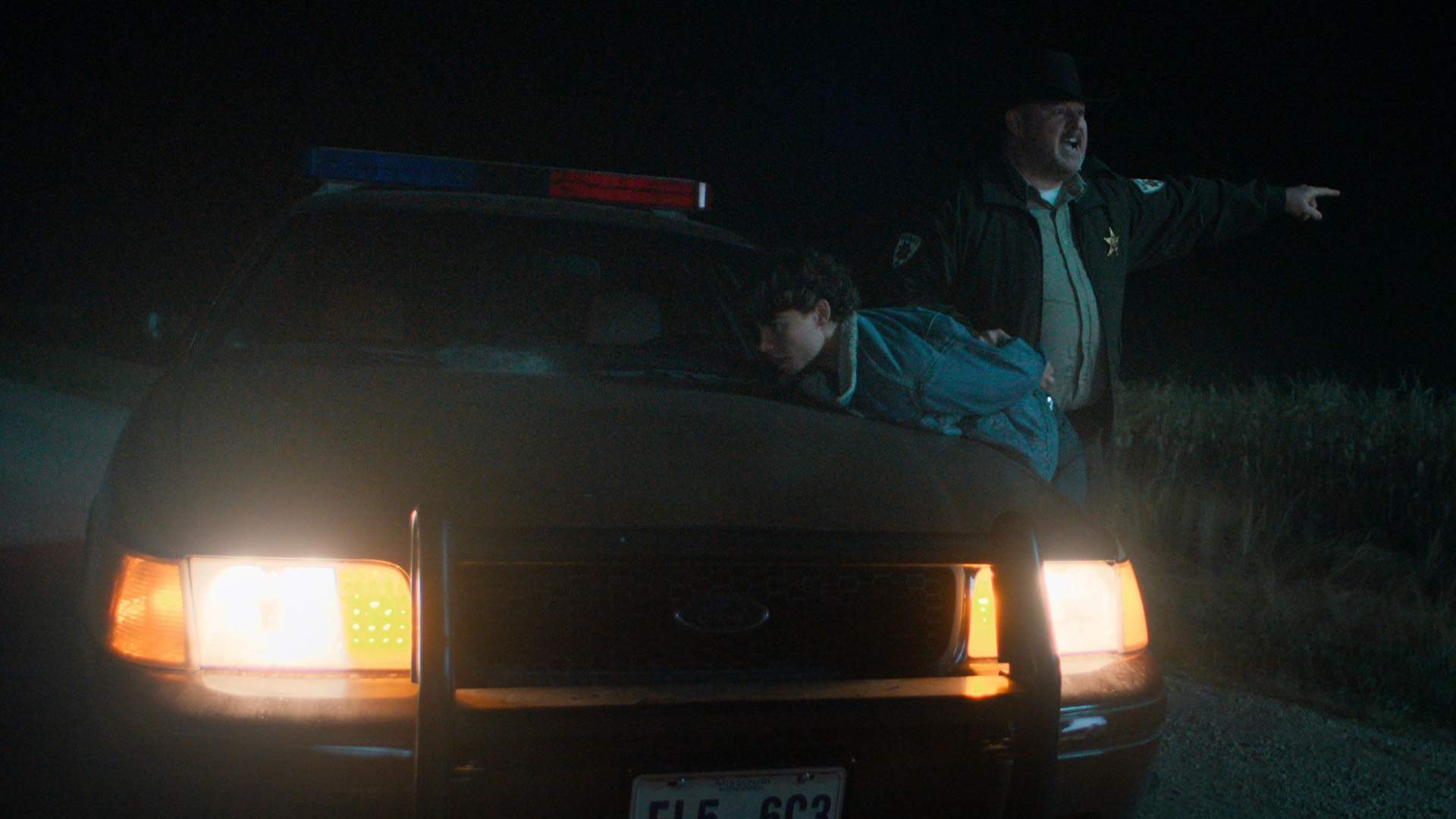
Will Sasso, as the sheriff, was just fantastic because he's threatening and creepy, but he's also just funny. He just brings a sense of humour and life to everything he does.
And Kevin Durand, I don't think I could get an actor that could be this role without playing into something that we've seen before. He really created a new character. And that was really important that we weren't like the Joker or something. He was really, really his own — and very grounded and more gritty and real — character."

On the Response to Tucker and Dale vs Evil 15 Years on — and What It Means for It to Be So Beloved as a Horror-Comedy Cult Classic
"It actually means I'm not crazy. So when I first made that film, I just believed in it naively, like with all of my heart. And I thought 'well, this is just going to be the biggest hit since Evil Dead 2'. And it wasn't that way. It didn't come out as a big hit. I thought I was making the next Shaun of the Dead or Evil Dead 2 — and it went to some great film festivals, but then once we came out, it kind of disappeared for a while.
And then over the years, people discovered it, and it truly became what I always believed it would be by now. And it's kind of validated my own feeling of art and my feeling of 'what entertains me should entertain other people'.
Because I'm just ultimately trying to make a film that that I want to go see. And if people start telling me they don't like what I would want to go see, it becomes much harder to make a movie. And now I feel like 'wait a minute, maybe, maybe my sensibility is a sensibility a lot of other people share'. So that means a lot."

Clown in a Cornfield released in cinemas Down Under on Thursday, May 8, 2025.
